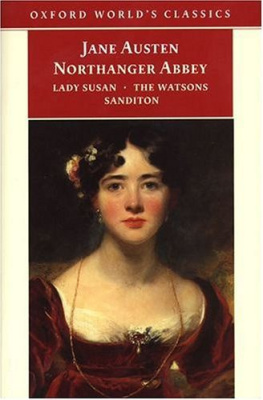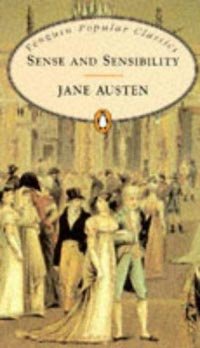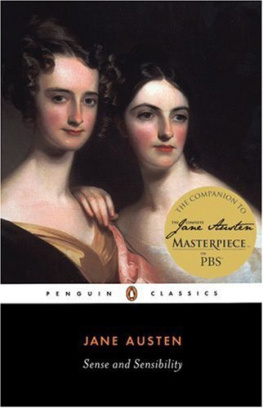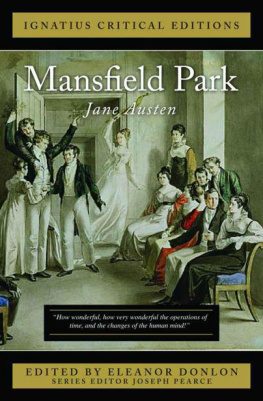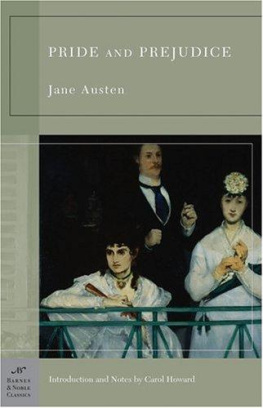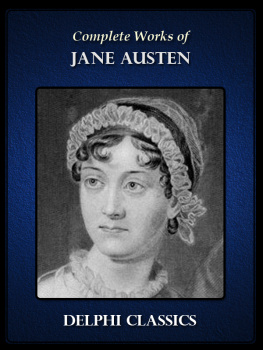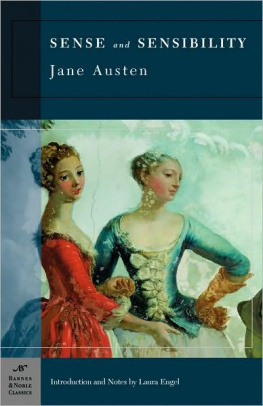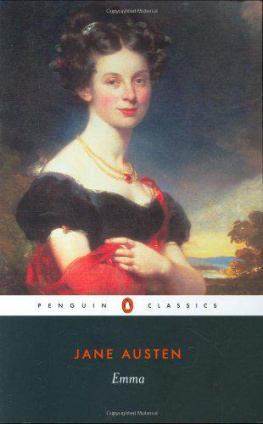Table of Contents
From the Pages of
Northanger Abbey

No one who had ever seen Catherine Morland in her infancy, would have supposed her born to be an heroine. (page 7)
Provided that nothing like useful knowledge could be gained from them, provided they were all story and no reflection, she had never any objection to books at all. (page 9)
In every power, of which taste is the foundation, excellence is pretty fairly divided between the sexes. (page 22)
No young lady can be justified in falling in love before the gentlemans love is declared, it must be very improper that a young lady should dream of a gentleman before the gentleman is first known to have dreamt of her. (page 24)
Friendship is certainly the finest balm for the pangs of disappointed love. (page 27)
Man only can be aware of the insensibility of man towards a new gown. (page 68)
Woman is fine for her own satisfaction alone. No man will admire her the more, no woman will like her the better for it. Neatness and fashion are enough for the former, and a something of shabbiness or impropriety will be most endearing to the latter. (page 68)
The person, be it gentleman or lady, who has not pleasure in a good novel, must be intolerably stupid. (page 99)
A woman especially, if she have the misfortune of knowing any thing, should conceal it as well as she can. (page 104)
From politics, it was an easy step to silence. (page 105)
Miss Morland, no one can think more highly of the understanding of women than I do. In my opinion, nature has given them so much, that they never find it necessary to use more than half. (page 107)
I cannot speak well enough to be unintelligible. (page 124)
We can tempt you neither by amusement nor splendour, for our mode of living, as you see, is plain and unpretending; yet no endeavours shall be wanting on our side to make Northanger Abbey not wholly disagreeable. (page 130)
You must be aware that when a young lady is (by whatever means) introduced into a dwelling of this kind, she is always lodged apart from the rest of the family. While they snugly repair to their own end of the house, she is formally conducted by Dorothy the ancient housekeeper up a different staircase, and along many gloomy passages, into an apartment never used since some cousin or kin died in it about twenty years before. Can you stand such a ceremony as this? Will not your mind misgive you, when you find yourself in this gloomy chambertoo lofty and extensive for you, with only the feeble rays of a single lamp to take in its sizeits walls hung with tapestry exhibiting figures as large as life, and the bed, of dark green stuff or purple velvet, presenting even a funereal appearance. Will not your heart sink within you? (page 148)
Does our education prepare us for such atrocities? (page 186)


Published by Barnes & Noble Books
122 Fifth Avenue
New York, NY 10011
www.barnesandnoble.com/classics
Northanger Abbey was published posthumously along with
Persuasion in 1818.
Published in 2005 by Barnes & Noble Classics with new
Introduction, Notes, Biography, Chronology, An Inspiration For,
Comments & Questions, and For Further Reading.
Introduction, Notes, and For Further Reading
Copyright @ 2005 by Alfred Mac Adam.
Note on Jane Austen, The World of Jane Austen and
Northanger Abbey, An Inspiration for Northanger Abbey, and
Comments & Questions
Copyright 2005 by Barnes & Noble, Inc.
All rights reserved. No part of this publication may be reproduced
or transmitted in any form or by any means, electronic or
mechanical, including photocopy, recording, or any information
storage and retrieval system, without the prior written permission
of the publisher.
Barnes & Noble Classics and the Barnes & Noble Classics
colophon are trademarks of Barnes & Noble, Inc.
Northanger Abbey
ISBN-13: 978-1-59308-264-2 ISBN-10: 1-59308-264-9
eISBN : 978-1-411-43279-6
LC Control Number 2004112102
Produced and published in conjunction with:
Fine Creative Media, Inc.
322 Eighth Avenue
New York, NY 10001
Michael J. Fine, President and Publisher
Printed in the United States of America
QM
7 9 10 8
Jane Austen

The English novelist Jane Austen was born on December 16, 1775, the seventh of eight children, in the Parsonage House of Steventon, Hampshire, where she spent her first twenty-five years. During her relatively brief lifetime Austen witnessed political unrest, revolution, war, and industrialization, yet these momentous events are not the central or explicit subjects of her finely focused novels. Rather, Austen wrote out of her immediate experience: the world of the country gentry and middle-class professional and business families. Janes father, the Reverend George Austen, was the well-read country rector of Steventon and her mother, Cassandra (nee Leigh), was descended from a well-connected line of learned clergymen. By no means wealthy, the Austens nonetheless enjoyed a comfortable and socially respectable life.
Jane and her beloved elder (and only) sister, Cassandra, were schooled in Southampton and Reading for short periods, but most of their education took place at home. Private theatrical performances in the barn at Steventon complemented Janes studies of French, Italian, history, music, and eighteenth-century fiction. An avid reader from earliest childhood, she began writing at age twelve, no doubt encouraged by her highly literate and affectionate family. Indeed, family and writing were her great loves. Despite a momentary engagement in 1802, Jane Austen never married. Her first two extended narratives, Elinor and Marianne and First Impressions, were written while she was at Steventon but were never published in their original form.
Following her fathers retirement, Jane moved in 1801 with her parents and sister to Bath. That popular watering hole, removed from the country life Jane preferred, presented the observant young writer with a wealth of events and experiences that would later be put to good use in her novels. Austen moved to Southampton with her mother and sister after the death of her father in 1805. Several years later the three women settled in Chawton Cottage in Hampshire, where Austen resided until the end of her life. She welcomed her return to the countryside and, with it, there came a renewed artistic vigor that led to the revision of her early novels. Sense and Sensibility, a reworking of Elinor and Marianne, was published in 1811, followed by Pride and Prejudice, a reworking of First Impressions, two years later.
Austen completed three more novels (Mansfield Park, Emma, and Persuasion) in the Chawton sitting room. Productive and discreet, she was not widely known to be the author of her published work. All of her novels were published anonymously, including the posthumous appearance, thanks to her brother Henry, of Northanger Abbey and Persuasion.
The last years of Austens life were relatively quiet and comfortable. Her final, unfinished work, Sanditon, was put aside in the spring of 1817, when her health sharply declined and she was taken to Winchester for medical treatment of what appears to have been Addisons disease or a form of lymphoma. Jane Austen died there on July 18, 1817, and is buried in Winchester Cathedral.
Next page
